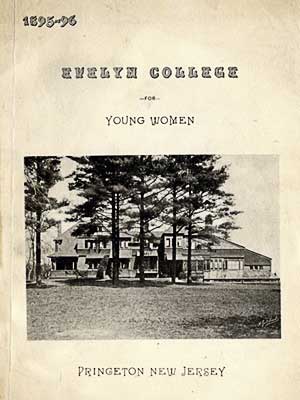
Page One
• Center values exchange of ideas on ethical issues
• Macedo’s interests mesh well with center’s emphasis
Inside
• Annan, global university leaders examine higher education’s benefits to society
• Professorship established in honor of Williams
• Plans progress for reconstruction of Butler College dormitories
• History of Reunions wear on display through July 28
People
• Benchmarking a notable career
• Board approves appointments of four new faculty members
• Spotlight, briefs
Almanac
• Nassau notes
• Calendar of events
• By the numbers

By the numbers
Evelyn College for Women
Princeton NJ — Evelyn College for Women created a pleasant stir in the borough of Princeton for 10 years toward the end of the 19th century.

The cover of an 1895-96 catalog from Evelyn College. (Courtesy of Mudd Manuscript Library)
• It was founded in 1887 by a 72-year-old clergyman and former Princeton professor, Joshua Hall McIlvaine, a member of Princeton’s class of 1837. Named after Sir John Evelyn, a 17th-century man of letters, the college was housed in two buildings about a mile east of the center of town, one on what is now called Evelyn Place, the other on the southwest corner of Nassau and Harrison streets.
• Although Evelyn had no legal connection with Princeton, it enjoyed most of the benefits of a coordinate college. President Francis Patton, Dean James Murray and Professors Allan Marquand and Charles Young were on its board of trustees, and most of Princeton’s senior professors lectured there. Enrollment was small, probably never more than 50 in one year, and made up largely of daughters of professors in the college and the seminary and sisters of Princeton undergraduates.
• When the newly formed Colonial Club rented the house next door to Evelyn College for its first clubhouse, it found its competitive position strengthened compared to the three slightly older eating clubs. Although McIlvaine complained to Patton that Colonial’s proximity meant the ruination of Evelyn, the club was allowed to enjoy its advantage until the expiration of its year’s lease.
• During the four-year depression that followed the Panic of 1893, hard times kept down enrollment and also diminished the chances of obtaining any sizable gifts for an endowment and buildings.
• After McIlvaine died in 1897, Evelyn College closed its doors, and Princeton had to wait almost three quarters of a century before education for women within its precincts became a reality with the implementation of coeducatin in 1969.
Source: “A Princeton Companion” by Alexander Leitch